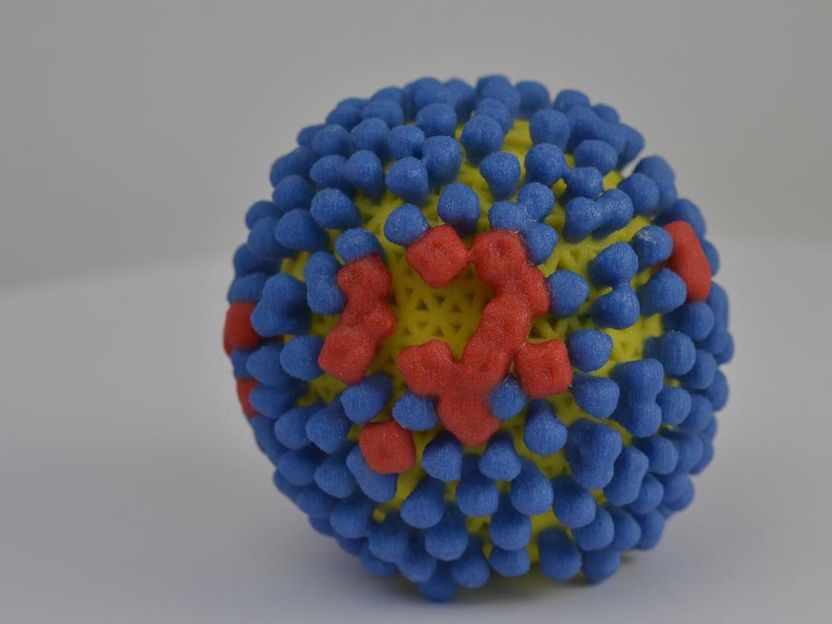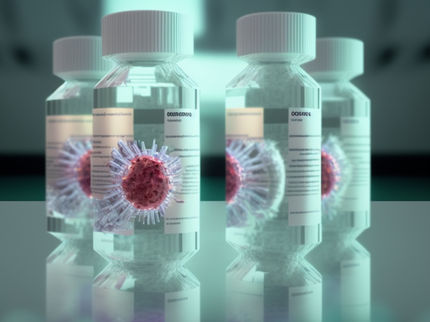Research offers clues for improved influenza vaccine design
influenza vaccines that better target the influenza surface protein called neuraminidase (NA) could offer broad protection against various influenza virus strains and lessen the severity of illness, according to new researchl. Current seasonal influenza vaccines mainly target a different, more abundant influenza surface protein called hemagglutinin (HA). However, because influenza vaccines offer varying and sometimes limited protection, scientists are exploring ways to improve vaccine effectiveness. The new research builds on previous studies of NA and was conducted by a team of scientists including investigators from the Centers of Excellence for Influenza Research and Surveillance (CEIRS) program, which is organized and funded by the National Institute of Allergy and infectious diseases (NIAID), part of the National Institutes of Health.

This is a 3-D print of influenza virus. The virus surface (yellow) is covered with proteins called hemagglutinin (blue) and neuraminidase (red).
NIH
Investigators analyzed blood samples from people vaccinated against influenza and people diagnosed with either the 2009 H1N1 influenza virus or H3N2 influenza viruses. The volunteers were recruited for this study or had taken part in prior influenza research studies. The analyses indicate that influenza vaccines rarely induce NA-reactive antibodies, whereas natural influenza infection induces these types of antibodies at least as often as they induce HA-reactive antibodies. Additional studies in mice reinforced the human data, indicating that current influenza vaccines do not induce NA-reactive antibodies efficiently.
Additional laboratory experiments show that the NA-reactive antibodies induced during natural influenza infection are broadly reactive, meaning they could potentially protect against diverse strains of influenza. To test this theory, scientists isolated NA-reactive monoclonal antibodies from the H3N2 and H1N1 influenza patients (N2-reactive antibodies and N1-reactive antibodies, respectively). They administered 13 N2-reactive antibodies to mice and subsequently infected the mice with a different H3N2 virus strain. Eleven of the 13 N2-reactive antibodies partially or fully protected the mice. They also administered eight N1-reactive antibodies to mice and subsequently infected the mice with a similar H1N1 virus strain or an H5N1-like virus strain. Four of the eight antibodies completely protected the mice against both virus strains.
The authors note that the findings suggest that influenza vaccines should be optimized to better target NA for broad protection against diverse influenza strains. In this regard, NIAID is supporting research to characterize NA responses in infected and vaccinated individuals and to determine the mechanism of action of NA protection. NIAID also supports "NAction!" a CEIRS working group that identifies knowledge gaps in our understanding of NA and sets NA research priorities for improved influenza vaccines . These efforts contribute to NIAID's larger plan to develop a universal influenza vaccine--a vaccine that can durably protect all age groups against multiple influenza virus strains.
Original publication
Other news from the department science
Most read news
More news from our other portals
See the theme worlds for related content
Topic world Antibodies
Antibodies are specialized molecules of our immune system that can specifically recognize and neutralize pathogens or foreign substances. Antibody research in biotech and pharma has recognized this natural defense potential and is working intensively to make it therapeutically useful. From monoclonal antibodies used against cancer or autoimmune diseases to antibody-drug conjugates that specifically transport drugs to disease cells - the possibilities are enormous

Topic world Antibodies
Antibodies are specialized molecules of our immune system that can specifically recognize and neutralize pathogens or foreign substances. Antibody research in biotech and pharma has recognized this natural defense potential and is working intensively to make it therapeutically useful. From monoclonal antibodies used against cancer or autoimmune diseases to antibody-drug conjugates that specifically transport drugs to disease cells - the possibilities are enormous























































